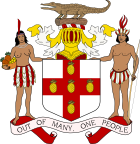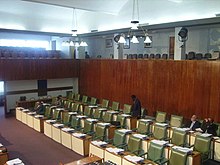
The politics of Antigua and Barbuda takes place in a framework of a unitary parliamentary representative democratic monarchy, wherein the sovereign of Antigua and Barbuda is the head of state, appointing a governor-general to act as vice-regal representative in the nation. A prime minister is appointed by the governor-general as the head of government, and of a multi-party system; the prime minister advises the governor-general on the appointment of a Council of Ministers. Executive power is exercised by the government. Legislative power is vested in both the government and the two chambers of the Parliament. The bicameral Parliament consists of the Senate and the House of Representatives.

The Government of Barbados (GoB), is a unitary parliamentary republic, where the President of Barbados represents as the head of state and the Prime Minister of Barbados represents as the head of government.
The politics of Grenada takes place in a framework of a parliamentary representative democracy, whereby the prime minister is the head of government. Grenada is an independent Commonwealth realm. It is governed under a multi-party parliamentary system whose political and legal traditions closely follow those of the United Kingdom; it has a prime minister and a cabinet, and a bicameral Parliament with an elected House of Representatives and an appointed Senate. Executive power is exercised by the government. Legislative power is vested in both the government and parliament. Constitutional safeguards include freedom of speech, press, worship, motion, and association. Grenada is a member of the eastern Caribbean court system. The Judiciary is independent of the executive and the legislature. Jurisprudence is based on English common law.

The Westminster system or Westminster model is a type of parliamentary government that incorporates a series of procedures for operating a legislature, first developed in England. Key aspects of the system include an executive branch made up of members of the legislature, and that is responsible to the legislature; the presence of parliamentary opposition parties; and a ceremonial head of state who is different from the head of government. The term comes from the Palace of Westminster, the current seat of the Parliament of the United Kingdom. The Westminster system is often contrasted with the presidential system that originated in the United States, or with the semi-presidential system, based on the government of France.

The Bahamas is a parliamentary constitutional monarchy headed by King Charles III in his role as King of the Bahamas. The politics of The Bahamas takes place within a framework of parliamentary democracy, with a Prime Minister as the Head of Government. The Bahamas is an Independent Country and a member of the Commonwealth of Nations. As a former British colony, its political and legal traditions closely follow those of the United Kingdom. King Charles III is the head of state, but executive power is exercised by the cabinet. Legislative power is vested in the two chambers of parliament. The Judiciary is independent of the executive and the legislature and jurisprudence is based on English common law. The multi-party system is dominated by the Progressive Liberal Party and the Free National Movement. The constitution protects freedom of speech, press, worship, movement, and association.

The politics of Barbados function within a framework of a parliamentary republic with strong democratic traditions; constitutional safeguards for nationals of Barbados include: freedom of speech, press, worship, movement, and association.

Belize is a parliamentary representative democratic monarchy, whereby the king of Belize serves as head of state and the prime minister is the head of government, and of a multi-party system. Executive power is exercised by the government. Legislative power is vested in both the government and the Parliament of Belize.
In a parliamentary or semi-presidential system of government, a reserve power, also known as discretionary power, is a power that may be exercised by the head of state without the approval of another branch or part of the government. Unlike in a presidential system of government, the head of state is generally constrained by the cabinet or the legislature in a parliamentary system, and most reserve powers are usable only in certain exceptional circumstances.
A constitutional convention is an informal and uncodified tradition that is followed by the institutions of a state. In some states, notably those Commonwealth of Nations states that follow the Westminster system and whose political systems derive from British constitutional law, most government functions are guided by constitutional convention rather than by a formal written constitution. In these states, actual distribution of power may be markedly different from those the formal constitutional documents describe. In particular, the formal constitution often confers wide discretionary powers on the head of state that, in practice, are used only on the advice of the head of government, and in some cases not at all.

The president of the Republic of Trinidad and Tobago is the head of state of Trinidad and Tobago and the commander-in-chief of the Trinidad and Tobago Defence Force. The office was established when the country became a republic in 1976, before which the head of state was the Queen of Trinidad and Tobago, Elizabeth II. The last governor-general, Sir Ellis Clarke, was sworn in as the first president on 1 August 1976 under a transitional arrangement. He was formally chosen as president by an electoral college consisting of members of both houses of Parliament on 24 September 1976, which is now celebrated as Republic Day.

The government of Canada is the body responsible for the federal administration of Canada. A constitutional monarchy, the Crown assumes distinct roles: the executive, as the Crown-in-Council; the legislative, as the Crown-in-Parliament; and the judicial, as the Crown-on-the-Bench. Three institutions—the Privy Council, the Parliament, and the judiciary, respectively—exercise the powers of the Crown.

The Australian Government, also known as the Commonwealth Government, is the national government of Australia, a federal parliamentary constitutional monarchy. Like other Westminster-style systems of government, the Australian Government is made up of three branches: the executive, the legislative, and the judicial.

The New Zealand Government is the central government through which political authority is exercised in New Zealand. As in most other parliamentary democracies, the term "Government" refers chiefly to the executive branch, and more specifically to the collective ministry directing the executive. Based on the principle of responsible government, it operates within the framework that "the [King] reigns, but the government rules, so long as it has the support of the House of Representatives". The Cabinet Manual describes the main laws, rules and conventions affecting the conduct and operation of the Government.

The monarchy of Jamaica is a system of government in which a hereditary monarch is the sovereign and head of state of Jamaica. The current Jamaican monarch and head of state, since 8 September 2022, is King Charles III. As sovereign, he is the personal embodiment of the Jamaican Crown. Although the person of the sovereign is equally shared with 14 other independent countries within the Commonwealth of Nations, each country's monarchy is separate and legally distinct. As a result, the current monarch is officially titled King of Jamaica and, in this capacity, he and other members of the royal family undertake public and private functions domestically and abroad as representatives of the Jamaican state. However, the monarch is the only member of the royal family with any constitutional role.

The monarchy of Grenada is a system of government in which a hereditary monarch is the sovereign and head of state of Grenada. The current Grenadian monarch and head of state, since 8 September 2022, is King Charles III. As sovereign, he is the personal embodiment of the Grenadian Crown. Although the person of the sovereign is equally shared with 14 other independent countries within the Commonwealth of Nations, each country's monarchy is separate and legally distinct. As a result, the current monarch is officially titled King of Grenada and, in this capacity, he and other members of the royal family undertake public and private functions domestically and abroad as representatives of Grenada. However, the King is the only member of the royal family with any constitutional role.
The Government of Quebec is the body responsible for the administration of the Canadian province of Quebec. A constitutional monarchy, the Crown is the corporation sole, assuming distinct roles: the executive, as the Crown-in-Council; the legislature, as the Crown-in-Parliament; and the courts, as the Crown-on-the-Bench. The powers of the Crown are exercised on behalf of three institutions—the Executive Council (Cabinet); the National Assembly; and the judiciary, respectively.
The royal prerogative is a body of customary authority, privilege, and immunity recognized in common law as belonging to the sovereign, and which have become widely vested in the government. It is the means by which some of the executive powers of government, possessed by and vested in a monarch with regard to the process of governance of the state, are carried out.
The Constitution of Tuvalu states that it is “the supreme law of Tuvalu” and that “all other laws shall be interpreted and applied subject to this Constitution”; it sets out the Principles of the Bill of Rights and the Protection of the Fundamental Rights and Freedoms.
The 19th Amendment (19A) to the Constitution of Sri Lanka was passed by the 225-member Sri Lankan Parliament with 215 voting in favor, one against, one abstained and seven were absent, on 28 April 2015. The amendment envisages the dilution of many powers of Executive Presidency, which had been in force since 1978. It is the most revolutionary reform ever applied to the Constitution of Sri Lanka since JR Jayawardhane became the first Executive President of Sri Lanka in 1978.

The president of Barbados is the head of state of Barbados and the commander-in-chief of the Barbados Defence Force. The office was established when the country became a parliamentary republic on 30 November 2021. Before, the head of state was Elizabeth II, Queen of Barbados, who was represented on the island by a governor-general. The first and current president is Sandra Mason, who previously served as the last governor-general.



















